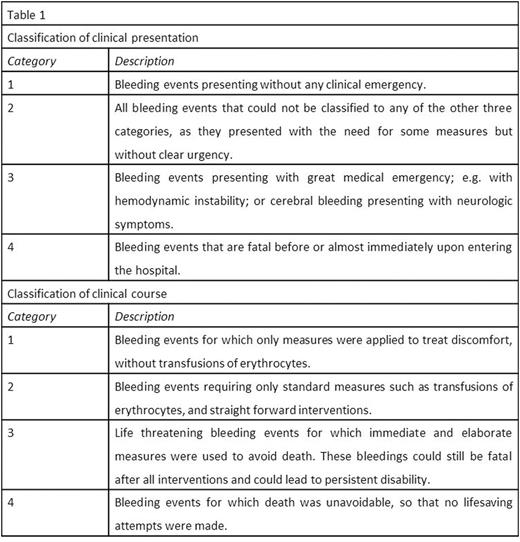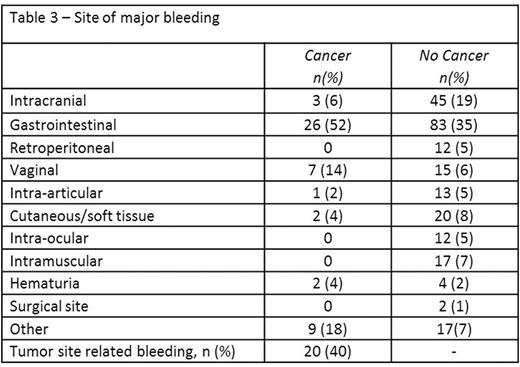Abstract
Background
Venous thromboembolism (VTE), comprising deep vein thrombosis and pulmonary embolism, is a frequent complication in cancer patients. During anticoagulant treatment for VTE, the risk of major bleeding events (MBE) is 2- to 6-fold higher in cancer patients than in those without cancer. It is unknown whether the clinical presentation and course of anticoagulant-related MBE in cancer patients differ from patients without cancer.
Methods
Individual patient data from 4 randomized controlled phase III trials in which factor Xa inhibitors (rivaroxaban, apixaban, and edoxaban) were compared with vitamin K antagonists for the treatment of VTE were used for the present analysis. The severity of the clinical presentation and clinical course of anticoagulant-related MBE were compared between patients with and without cancer. Using predefined criteria, the severity of the clinical presentation and course of MBE were classified into four categories by independent adjudicators, who were blinded to treatment allocation. Category 1 indicates a mild clinical presentation or course, while category 4 indicates a severe presentation or course (Table 1). A one-stage meta-analysis was used to estimate crude odds ratios (ORs) and ORs adjusted for age, sex, and type of anticoagulant treatment with 95% confidence intervals (CIs) for the effect of cancer on the severity of the clinical presentation and course. For this analysis categories 3 and 4 were combined. We also explored the cause and site of bleeding in these patients.
Results
The study group comprised 290 patients with MBE, of whom 50 (17%) had active cancer or were diagnosed with cancer during follow-up. The clinical presentation was judged to be severe (category 3 or 4) in 38% of patients with cancer and 44% of patients without cancer (adjusted OR 0.90, 95% CI 0.47-1.72). Clinical course was judged to be severe in 20% and 25% of patients with and without cancer, respectively (adjusted OR 0.75, 95% CI 0.35-1.61) (Table 2). The bleeding pattern varied significantly between the two groups (p=0.002); cancer patients more often had gastrointestinal (52% vs. 35%) and vaginal (14% vs. 6%) MBE, whereas intracranial (19% vs. 6% and retroperitoneal (5% vs. 0%) MBE occurred more often in patients without cancer (Table 3). MBE was related to the tumor site in 40% of cancer patients.
Conclusion
The findings of the present study indicate that the clinical presentation and course of anticoagulant-related MBE are not more severe in cancer patients than in patients without cancer, which is reassuring for physicians who treat cancer-associated VTE.
Eerenberg:Sanquin: Consultancy; CSL Behring: Consultancy; Baxter: Consultancy. Middeldorp:Aspen: Consultancy, Honoraria; Boehringer Ingelheim: Consultancy; Daiichi Sankyo: Consultancy, Honoraria; Bayer: Consultancy; Sanquin: Consultancy; GSK: Consultancy, Honoraria; BMS/Pfizer: Consultancy, Honoraria. Cohen:Takeda: Consultancy; Leo Pharma: Consultancy; GlaxoSmithKline: Consultancy, Speakers Bureau; Daiichi Sankyo: Consultancy, Honoraria, Speakers Bureau; Bayer: Consultancy, Honoraria, Speakers Bureau; Department of Health: Membership on an entity's Board of Directors or advisory committees; Bristol-Myers Squibb: Consultancy, Honoraria, Speakers Bureau; Medscape: Speakers Bureau; UK Government Health Select Committee: Membership on an entity's Board of Directors or advisory committees; Boehringer Ingelheim: Consultancy, Speakers Bureau; Colation to Prevent Venous Thromboembolism: Other: Founder; NHS: Membership on an entity's Board of Directors or advisory committees; Johnson & Johnson: Consultancy, Honoraria, Speakers Bureau; Pfizer: Consultancy, Honoraria, Speakers Bureau; Aspen: Consultancy, Speakers Bureau; ONO: Consultancy, Honoraria; XO1: Consultancy, Honoraria; Portola: Consultancy, Honoraria, Speakers Bureau; Janssen: Consultancy; Lifeblood: Membership on an entity's Board of Directors or advisory committees; Sanofi: Consultancy, Honoraria.
Author notes
Asterisk with author names denotes non-ASH members.




This feature is available to Subscribers Only
Sign In or Create an Account Close Modal